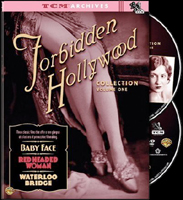 BUY IT AT AMAZON: CLICK HERE!
BUY IT AT AMAZON: CLICK HERE!
STUDIO: Warner
MSRP: $39.98
RATED: Not rated
SPECIAL FEATURES:
• Disc 1: Introduction by Robert Osborne
• Disc 2: Baby Face theatrical trailer
Hollywood’s ‘Pre-Code Era’ lasted approximately four years, paralleling the growth of the talkies. It’s a bit of a misnomer: the Hays Office had been established in 1922, but didn’t start directly enforcing Production Code standards (and denying a release certificate to productions that didn’t comply) until 1934. The Great Depression had hit the movie industry hard; depending on whom you ask, either the public developed a taste for more realistic fare or the studios chose to lure audiences with ever more sensational content.
This set provides a quick tour through the period. The three films share the same premise: an economically disadvantaged woman uses sex appeal to survive, eventually landing a rich, respectable man—but not without consequences. The divergent treatments of this theme reflect not only the year in which each film was made, but the studio from which it originated. It so happens that Time Warner currently controls the rights to the early catalogs of Universal, MGM, and Warner Bros, making such a collection possible.
Extra credit: each film also features an early appearance from a not-yet-famous Hollywood legend.

Waterloo Bridge (1931, Universal)
RUNNING TIME: 81 min
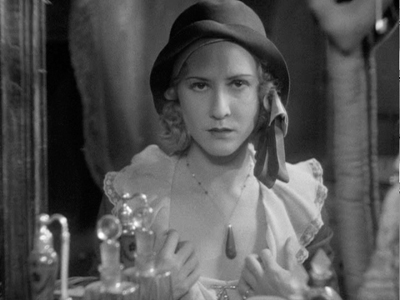
"Mirror, mirror, on the wall… let’s make a deal."
The Humans
Mae Clarke (The Public Enemy), Kent Douglass (Little Women), Doris Lloyd, Enid Bennett, Bette Davis (Three on a Match)
The Nutshell
Myra (Clarke) is a showgirl fallen on hard times, doing what she can to pay the rent. As fate would have it, it’s World War I London and there’s no shortage of lonely soldiers eager to buy a night’s company. By the time she picks up Roy (Douglass), a young corporal just returned from the horrors of Ypres, she’s put thoughts of romance out of her mind. But the boy’s never been in love before: can he handle the truth? And what about his warm, welcoming family—how will they react to the discovery of a whore in their midst?
The Lowdown
Waterloo Bridge displays minor evidence of studio softening. Despite Clarke’s world-weary characterization it’s carefully established that Myra hasn’t been walking the streets for very long, and the film’s ending is judgmental in its abruptness.
What’s fascinating about the way the story plays out, and what qualifies it as a Pre-Code artifact, is that nobody is a crueler judge of Myra than Myra herself. Where other characters see her for her better qualities, she sees nothing but her shame. And ultimately, what becomes of her is not what she deserves, or what is forced upon her, but what she expects.
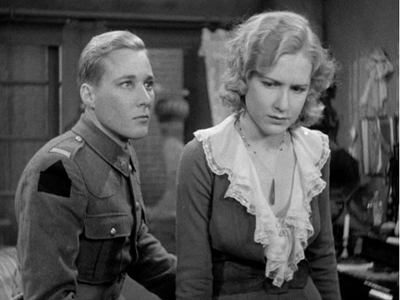
"I told you, John. We can’t stay together if
you’re gonna keep on being prettier than me."
James Whale (Frankenstein) directs efficiently and imaginatively. A survivor of the trenches, he’s able to convey the spectre of war without showing it directly. Fans of early visual effects will enjoy his studio-bound reconstruction of London and the titular bridge: there’s some unusually adventurous work with miniatures and traveling mattes. And yes, history class, the Germans bombed London during WWI as well as WWII so it’s not an anachronism.
The main reason this film has gone largely unseen for decades has less to do with its content and more to do with the fact that it was withdrawn from circulation when MGM remade it (in far more melodramatic fashion) with Vivien Leigh in 1940. While the subject matter is edgy, the 1931 film never courted controversy like the two features that follow it here.
8 out of 10

Red-Headed Woman (1932, MGM)
RUNNING TIME: 79 min
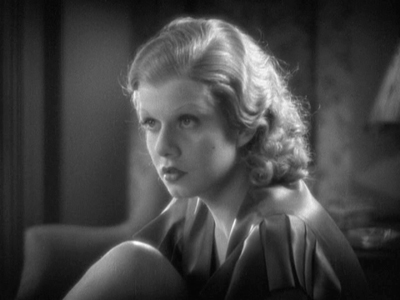
Beldar’s big day
The Humans
Jean Harlow (Bombshell), Chester Morris, Lewis Stone, Leila Hyams, Una Merkel, Charles Boyer (Algiers)
The Nutshell
Lil Andrews (Harlow), a mercenary nitwit from the wrong side of the tracks, storms through the sex lives of a wealthy family as she sets her sights on the good life.
The Lowdown
This is the most gleefully trashy film in the set, a fact that is belied by its high production values. MGM Producer Irving Thalberg arranged the inspired pairing of rising star Harlow and writer Anita Loos (Gentlemen Prefer Blondes) and let nature take its course. On paper, Lil’s actions are indefensible: Depression audiences probably responded to her assault on the well-to-do as much as to her well-displayed body, but she’s quite simply a terrible person. Harlow’s unique personal quality, that of a child playing dress-up, makes it work.
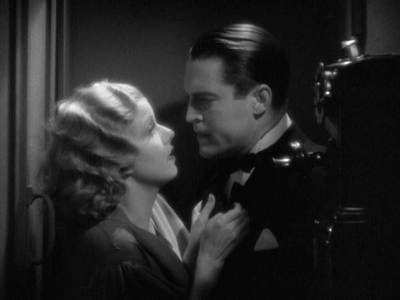
"Please deposit thirty-five cents for the next five minutes."
Another note on Harlow: Whatever one may think of her talents as an actress, she was a movie star in the true sense. To appreciate her is to see her in motion, bouncing and strutting about. Still pictures don’t do her justice.
7 out of 10

Baby Face (1933, Warner Bros)
RUNNING TIME (theatrical): 72 min
(pre-release): 76 min
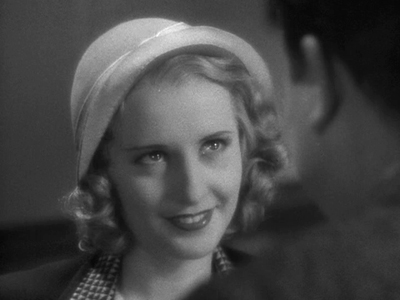
"I don’t know what you’re talking about.
There never was any chrome on that trailer hitch."
The Humans
Barbara Stanwyck (The Miracle Woman), George Brent, Alphonse Ethier, John Wayne (The Big Trail), Robert Barrat, Theresa Harris
The Nutshell
Abused and exploited by her lowlife father, a speakeasy ‘hostess’ (Stanwyck) is encouraged by kindly customer Cragg (Ethier) to use her talents to empower herself. She runs off to New York and sleeps her way to the top of a banking firm, breaking hearts on every floor. After one of her affairs results in a public scandal, she adopts a low profile—which proves irresistible to her new boss (Brent).
The Lowdown
Warner Brothers made careful note of Red-Headed Woman’s success. They promptly argued to the Code office that a precedent had been set, and demanded that the same level of permissiveness be afforded to them. The studio was building a reputation for ‘socially conscious’ films, and Baby Face explores the socio-economic roots of sexual opportunism. Where Harlow had been presented as a force of nature in the MGM film, Stanwyck’s character (also named Lily) is the product of a depressed industrial environment. Her actions may be amoral, but, the film asks, what other options does she have? And isn’t she entitled to use them? Unlike poor Myra in Waterloo Bridge, Lily isn’t content merely to survive—she wants to thrive, and the film supports her choice to aspire to a better life.
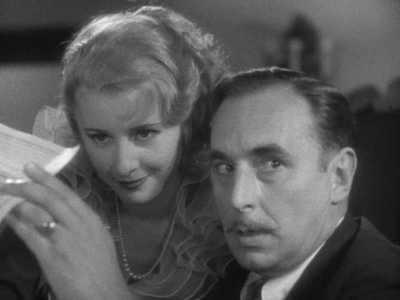
One ring to rule them all…
Stanwyck is excellent, in one of her first film roles. She shows us the calculation behind Lily’s seductions, letting us laugh at how easily she bends men to her will with determined eye contact or a well-timed flash of leg. At the same time, she makes it clear that Lily isn’t doing this for fun– but doesn’t hate herself for doing it either.
Baby Face was raw enough in its original release, but this set features an extraordinary bonus—a pre-release version of the film, thought lost for sixty years. Many of the differences are subtle but significant. Before, we could safely assume that Lily’s father was pimping her out; now we actually see money change hands. Before, Lily waited until she got to the big city to put her sexual powers in play; now we see her trade one free ride for another as soon as she hops a boxcar, making a quick negotiation with the railroad guard.
The most profound alteration is the character of Cragg, the guy who sets her on the road to self-actualization in the first place. In the release version he preaches virtue and Good Choices, and supplies Lily with inspirational literature. In the original edit, he urges her to exploit herself, and we get a good look at the book:
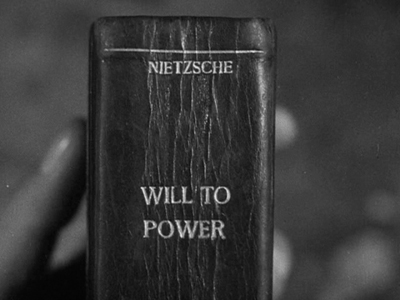
Ooookay.
It would be pretty to think that the filmmakers intended us to recognize Cragg’s superficial reading of Nietzsche (he mispronounces the name), and Lily’s second-hand adoption of said philosophy, for what it was– especially considering the global-political climate of the 1930s. But the pre-release version keeps plugging away like an infomercial, throwing in Thoughts Out of Season for good measure. Score one for the censors—the Book Club moments distract from the story and diminish Lily’s character. It’s fascinating history though.
9 out of 10

The Package
Both discs overlap on a single tray, and when everything’s put away in the cardboard slipcover (Norma Shearer’s legs on the front, I believe) it takes up less space than most single-disc cases. Disc 1 contains Red-Headed Woman and Waterloo Bridge, plus the TCM intro. Disc 2 is given over to both versions of Baby Face, plus the trailer (Note: On my set, the disc labels were switched, so watch out). Surprisingly, the only other supplement is a paper insert with an essay that briefly points out some of the differences between the Baby Faces. A mini-documentary, like the ones on Warner’s disc of The Big Sleep, or Fox’s My Darling Clementine, would be preferable but if this is what it takes to get flicks like these released then here’s to future volumes.
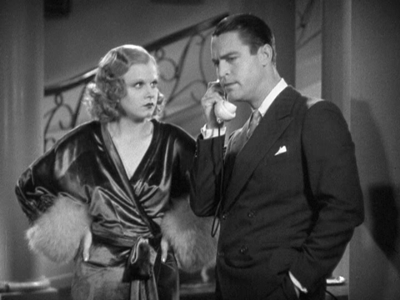
"Strange… all I can hear is a sort of heavy breathing."